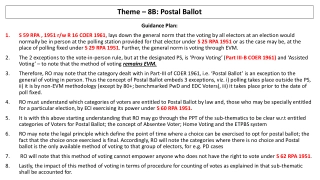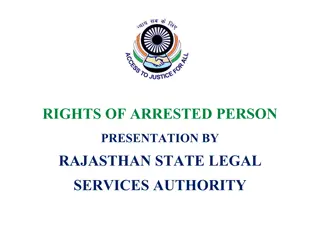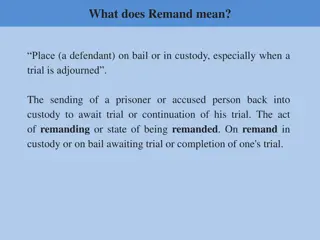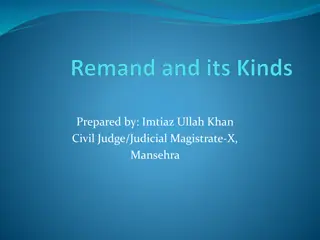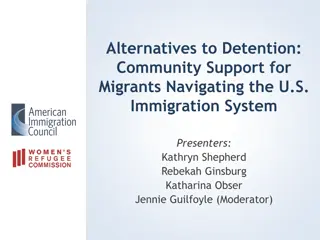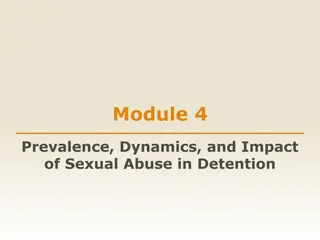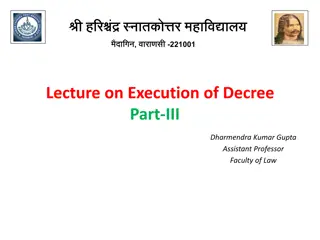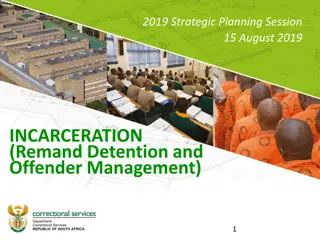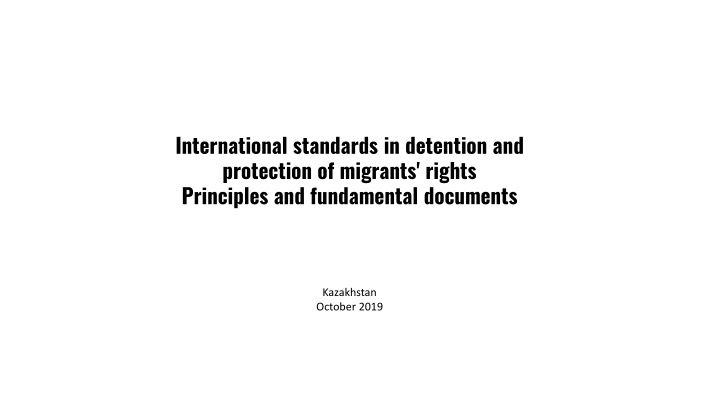
International Standards in Detention and Protection of Migrants' Rights
Explore the international standards in detention and protection of migrants' rights, including the nature of detention, relevant UN treaties, and the distinction between immigration detention and criminal incarceration. Learn about the right to liberty and the implications of deprivation of liberty for migrants.
Download Presentation

Please find below an Image/Link to download the presentation.
The content on the website is provided AS IS for your information and personal use only. It may not be sold, licensed, or shared on other websites without obtaining consent from the author. If you encounter any issues during the download, it is possible that the publisher has removed the file from their server.
You are allowed to download the files provided on this website for personal or commercial use, subject to the condition that they are used lawfully. All files are the property of their respective owners.
The content on the website is provided AS IS for your information and personal use only. It may not be sold, licensed, or shared on other websites without obtaining consent from the author.
E N D
Presentation Transcript
International standards in detention and protection of migrants' rights Principles and fundamental documents Kazakhstan October 2019
What is immigration detention? Immigration detention: deprivation of liberty for migration-related reasons // Criminal incarceration: deprivation of liberty of a citizen or non- citizen due to criminal charges or convictions.
RIGHT TO LIBERTY: Relevant UN Treaties: Kazakhstan ICCPR - International Covenant on Civil and Political Rights see also Human Rights Committee, General Comment No 35 and UN Working Group on Arbitrary Detention (WGAD), Revised Deliberation No. 5 on deprivation of liberty of migrants, 7 February 2018 Geneva Convention relating to the Status of Refugees (1951) See also UNHCR, Guidelines on the Applicable Criteria and Standards relating to the Detention of Asylum-Seekers and Alternatives to Detention, 2012 CRC - Convention on the Rights of the Child CED - Convention for the Protection of All Persons from Enforced Disappearance CRPD - Convention on the Rights of Persons with Disabilities CAT - Convention against Torture and Other Cruel Inhuman or Degrading Treatment or Punishment Individual complaints procedures under ICCPR and CAT. Inquiry procedures: CAT and CED
The nature of detention Deprivation of liberty//restriction of movement - not defined with reference to the classification imposed by national law - Whether a place where those held in the course of migration proceedings is a place of detention depends on whether the individuals held there are free to leave it at will or not UN Working Group on Arbitrary Detention, Revised Deliberation No. 5 on deprivation of liberty of migrants, 7 February 2018 - Distinction between deprivation of liberty (detention) and restriction of movement is one of degree or intensity and not one of nature or substance the starting point must be his concrete situation and account must be taken of a whole range of criteria such as the type, duration, effects and manner of implementation of the measure in question ECtHR, Guzzardi v. Italy, Application no. 7367/76, 6 November 1980.
The nature of detention Deprivation of liberty//restriction of movement house arrest Human Rights Committee, Gorji-Dinka v. Cameroon, Communication No. 1134/2002 special supervision for three years with the obligation to reside on a small island ECtHR, Guzzardi v. Italy, Application no. 7367/76, 6 November 1980 confinement to a restricted area of an airport Human Rights Committee, Concluding observations: Belgium (CCPR/CO/81/BEL, 2004), para. 17 ECtHR, Amuur v. France, Application no. 19776/92, 25 June 1996; Shamsa v. Poland, Application no. 45355/99 45357/99, 27 November 2003 They were placed under strict and constant police surveillance and had no legal and social assistance... neither the length nor the necessity of their confinement were reviewed by a court. The mere fact that it is possible for asylum-seekers to leave voluntarily the country where they wish to take refuge cannot exclude a restriction on liberty
restriction in a reception centre on the island of Lampedusa and on ships in Palermo harbor ECtHR, Khlaifia and others v. Italy, Application no. 16483/12, 15 December 2016 the applicants were being held at the CSPA involuntarily reporting obligation once per day (not detention); HRC, Salah Karker v. France, Communication No. 833/1998 If detention Art 9 ICCPR Restriction of Movement Art 12 ICCPR
ICCPR - International Covenant on Civil and Political Rights Article 9(1) Everyone has the right to liberty and security of person. No one shall be subjected to arbitrary arrest or detention. No one shall be deprived of his liberty except on such grounds and in accordance with such procedure as are established by law
General Comment No. 35 No one shall be deprived of liberty except on such grounds and in accordance with such procedure as are established by law. Any substantive grounds for arrest or detention must be prescribed by law and should be defined with sufficient precision to avoid overly broad or arbitrary interpretation or application. Deprivation of liberty without such legal authorization is unlawful. Detention in the course of proceedings for the control of immigration is not per se arbitrary, but the detention must be justified as reasonable, necessary and proportionate in the light of the circumstances and reassessed as it extends in time. Asylum seekers who unlawfully enter a State party s territory may be detained for a brief initial period in order to document their entry, record their claims and determine their identity if it is in doubt. To detain them further while their claims are being resolved would be arbitrary in the absence of particular reasons specific to the individual, such as an individualized likelihood of absconding, a danger of crimes against others or a risk of acts against national security.
General Comment No. 35 The decision must consider relevant factors case by case and not be based on a mandatory rule for a broad category; must take into account less invasive means of achieving the same ends, such as reporting obligations, sureties or other conditions to prevent absconding; and must be subject to periodic re-evaluation and judicial review. Decisions regarding the detention of migrants must also take into account the effect of the detention on their physical or mental health. Any necessary detention should take place in appropriate, sanitary, non-punitive facilities and should not take place in prisons. The inability of a State party to carry out the expulsion of an individual because of statelessness or other obstacles does not justify indefinite detention
Clear legal base Detention should be in accordance with national law and in accordance with such procedures as prescribed by national law Human Rights Committee, Communication No. 2024/2011, Israil v. Kazakhstan National law should be sufficient precise See also ECtHR, Khlaifia and Others v. Italy [GC], application no. 16483/12 , 15 December 2016, 91-92 in accordance with a procedure prescribed by law primarily requires any arrest or detention to have a legal basis in domestic law. However, these words do not merely refer back to domestic law. They also relate to the quality of the law - Quality of law: the law should be accessible, precise and foreseeable
Protection from arbitrariness An arrest or detention may be authorized by domestic law and nonetheless be arbitrary The notion of arbitrariness is not to be equated with against the law but must be interpreted more broadly to include elements of inappropriateness, injustice, lack of predictability and due process of law Detention in the course of proceedings for the control of immigration is not arbitrary per se, butthe detention must be justified as reasonable, necessary and proportionate in the light of the circumstances and reassessed as it extends in time. Human Rights Committee, F.K.A.G. et al. v. Australia, Communication No. 2094/2011; M.G.C. v Australia, Communication No. 1875/2009.
Protection from arbitrariness 1. Justification on an individual basis (case by case) - Human Rights Committee, Danyal Shafiq v. Australia, Communication No. 1324/2004, 7.3 the State party has provided as justification for the author's detention its general experience that asylum seekers abscond if not retained in custody The State party has not provided any other justification, in relation to the author's particular case, which would justify his continued detention - Human Rights Committee, M.M.M. et al. v. Australia, Communication No. 2136/2012, 10.3-10.4 The decision must consider relevant factors case-by-case, and not be based on a mandatory rule for a broad category Whatever justification there may have been for an initial detention, for instance for purposes of ascertaining identity and other issues, the State party has not, in the Committee s opinion, demonstrated on an individual basisthat their continuous indefinite detention is justified . UN Working Group on Arbitrary Detention, Revised Deliberation no. 5 of deprivation of liberty of migrants, 19. The need to detain should be assessed on an individual basis and not based on a formal assessment of the migrant s current migration status. The detention must comply with the principle of proportionality and as such, automatic and/or mandatory detention in the context of migration is arbitrary
Protection from arbitrariness 2. Detention must be justified as reasonable The element of reasonableness requires that the detention be imposed in pursuance of a legitimate aim in each individual case UN Working Group on Arbitrary Detention, Revised Deliberation No. 5 on deprivation of liberty of migrants, 7 February 2018, 22. - Human Rights Committee, Samba Jalloh v. the Netherlands, Communication No. 794/1998, 8.2 The Committee notes that "arbitrariness" must be interpreted more broadly than "against the law" to include elements of unreasonableness. Considering the author's flight from the open facility at which he was accommodated from the time of his arrival for around 11 months, the Committee considers that it was not unreasonable to have detained the author for a limited time until the administrative procedure relating to his case was completed. Once a reasonable prospect of expelling him no longer existed his detention was terminated
Protection from arbitrariness See also - WGAD Opinion No. 45/2006 A/HRC/7/4/Add.1 (2007), p.40 (Abdi v UK) 25 26 the asserted purpose of detention, i.e. removal, cannot in fact justify the detention because it is entirely unrealistic - ECtHR, A. and Others v. United Kingdom, Application No 3455/05, 19 February 2009, 169. There is no evidence that during the period of the applicants detention there was any realistic prospect of their being expelled - EU Return Directive (2008/115/EU), Art. 15(4) When it appears that a reasonable prospect of removal no longer exists for legal or other considerations or the conditions laid down in paragraph 1 no longer exist, detention ceases to be justified and the person concerned shall be released immediately
Protection from arbitrariness 3. Further justification other than illegal entry/asylum application after an initial brief period of detention obligation for periodical review - Human Rights Committee, F.K.A.G. et al. v. Australia, Communication No. 2094/2011 Asylum seekers who unlawfully enter a State party s territory may be detained for a brief initial period in order to document their entry, record their claims and determine their identity if it is in doubt. To detain them further while their claims are being resolved would be arbitrary absent particular reasons specific to the individual, such as an individualized likelihood of absconding, danger of crimes against others, or risk of acts against national security
Protection from arbitrariness - Human Rights Committee, A. v. Australia, Communication No. 560/1993 Remand in custody could be considered arbitrary if it is not necessaryin all the circumstances of the case, for example to prevent flight or interference with evidence: the element of proportionality becomes relevant in this context. The State party however, seeks to justify the author's detention by the fact that he entered Australia unlawfully and by the perceived incentive for the applicant to abscond if left in liberty The Committee observes however, that every decision to keep a person in detention should be open to review periodically so that the grounds justifying the detention can be assessed. In any event, detention should not continue beyond the period for which the State can provide appropriate justification. For example, the fact of illegal entry may indicate a need for investigation and there may be other factors particular to the individuals, such as the likelihood of absconding and lack of cooperation, which may justify detention for a period. Without such factors detention may be considered arbitrary, even if entry was illegal. In the instant case, the State party has not advanced any grounds particular to the author's case, which would justify his continued detention for a period of four years, during which he was shifted around between different detention centres .
Protection from arbitrariness 4. Obligation to examined less coercive measures -Human Rights Committee, F.K.A.G. et al. v. Australia, Communication No. 2094/2011 The State party has not demonstrated that other, less intrusive, measures could not have achieved the same end of compliance with the State party s need to respond to the security risk that the adult authors are said to represent . See also Human Rights Committee, M.G.C. v. Australia, Communication No. 1875/2009. - Human Rights Committee, C v. Australia, Communication No. 900/1999. the State party has not demonstrated that, in the light of the author's particular circumstances [mental health issues], there were not less invasive means of achieving the same ends, that is to say, compliance with the State party's immigration policies, by, for example, the imposition of reporting obligations, sureties or other conditions which would take account of the author's deteriorating condition UN Working Group on Arbitrary Detention, Revised Deliberation no. 5 of deprivation of liberty of migrants, 12,16 Any form of administrative detention or custody in the context of migration must be applied as an exceptional measure of last resort .. Alternatives to detention must be sought to ensure that the detention is resorted to as an exceptional measure ,
Protection from arbitrariness 5. Duration of the detention -Human Rights Committee, D&E v Australia, Communication No. 1050/2002, 7.2. in order to avoid any characterization of arbitrariness, detention should not continue beyond the period for which a State party can provide appropriate justification - Human Rights Committee, M.M.M. v. Australia, Communication No. 2136/2012 Individuals must not be detained indefinitely on immigration control grounds if the State party is unable to carry out their expulsion The Committee observes that the authors have been kept in immigration detention since 2009- 2010, first under mandatory detention upon arrival and then as a result of adverse security assessments. Whatever justification there may have been for an initial detention, for instance for purposes of ascertaining identity and other issues, the State party has not, in the Committee s opinion, demonstrated on an individual basis that their continuous indefinite detention is justified
Protection from arbitrariness See also: A maximum detention period in the course of migration proceedings must be set by legislation, and such detention shall be permissible only for the shortest period of time. Excessive detention in the course of migration proceedings is arbitrary Indefinite detention of individuals in the course of migration proceedings cannot be justified and is arbitrary UN Working Group on Arbitrary Detention, Revised Deliberation no. 5 of deprivation of liberty of migrants, 25-26 Guideline 7: Indefinite detention is arbitrary and maximum limits on detention should be established in law UNHCR, Guidelines on the Applicable Criteria and Standards relating to the Detention of Asylum-Seekers and Alternatives to Detention (2012) The length of the detention should not exceed that reasonably required for the purpose pursued ECtHR, Saadi v. United Kingdom, Application no 13229/03, 29 January 2008, 74; A. and Others v. the United Kingdom, Application No 3455/05, 19 February 2009, 164
Detention of Asylum Seekers Geneva Convention relating to the Status of Refugees (1951) Article 31. 1. The Contracting States shall not impose penalties, on account of their illegal entry or presence, on refugees who, coming directly from a territory where their life or freedom was threatened in the sense of Article 1, enter or are present in their territory without authorization, provided they present themselves without delay to the authorities and show good cause for their illegal entry or presence. 2. The Contracting States shall not apply to the movements of such refugees restrictions other than those which are necessary and such restrictions shall only be applied until their status in the country is regularized or they obtain admission into another country. The Contracting States shall allow such refugees a reasonable period and all the necessary facilities to obtain admission into another country.
Detention of Asylum Seekers UNHCR, Guidelines on the Applicable Criteria and Standards relating to the Detention of Asylum-Seekers and Alternatives to Detention (2012) Guideline 3: Detention must be in accordance with and authorised by law Guideline 4: Detention must not be arbitrary, and any decision to be based on an assessment of the individual s particular circumstances detain must Guideline 4.1: Detention is an exceptional measure and can only be justified for a legitimate purpose to protect public order; to prevent absconding and/or in cases of likelihood of non-cooperation; in connection with accelerated procedures for manifestly unfounded or clearly abusive claims;
Detention of Asylum Seekers for initial identity and/or security verification; in order to record, within the context of a preliminary interview, the elements on which the application for international protection is based, which could not be obtained in the absence of detention; to protect public health; to protect national security. Guideline 4.2: Detention can only be resorted to when it is determined to be necessary, reasonable in all the circumstances and proportionate to a legitimate purpose Guideline 4.3: Alternatives to detention need to be considered The deprivation of liberty of an asylum-seeking, refugee, stateless or migrant child, including unaccompanied or separated children, is prohibited. UN Working Group on Arbitrary Detention, Revised Deliberation no. 5 of deprivation of liberty of migrants, 19
Detention of Children Article 24 ICCPR: Every child shall have, without any discrimination the right to such measures of protection as are required by his status as a minor, on the part of his family, society and the State - Human Rights Committee, Bakhtiyari v. Australia, Communication No. 1069/2002 the Committee considers that the principle that in all decisions affecting a child, its best interests shall be a primary consideration, forms an integral part of every child's right to such measures of protection as required by his or her status as a minor, on the part of his or her family, society and the State, as required by article 24, paragraph 1, of the Covenant General Comment No 35: Children should not be deprived of liberty, except as a measure of last resort and for the shortest appropriate period of time, taking into account their best interests as a primary consideration with regard to the duration and conditions of detention, and also taking into account the extreme vulnerability and need for care of unaccompanied minors. Human Rights Committee, D. and E. v. Australia, Communication No. 1050/2002, 7.2; Jalloh v. Netherlands, Communication No. 794/1998, paras. 8.2 8.3
Detention of Children Article 3 (1) CRC: In all actions concerning children, whether undertaken by public or private social welfare institutions, courts of law, administrative authorities or legislative bodies, the best interests of the child shall be a primary consideration Article 37 (b) CRC: No child shall be deprived of his or her liberty unlawfully or arbitrarily. The arrest, detention or imprisonment of a child shall be in conformity with the law and shall be used only as a measure of last resort and for the shortest appropriate period of time Every child, at all times, has a fundamental right to liberty and freedom from immigration detention the detention of any child because of their or their parents migration status constitutes a child rights violation and contravenes the principle of the best interests of the child children should never be detained for reasons related to their or their parents migration status . Any kind of child immigration detention should be forbidden by law and such prohibition should be fully implemented in practice Joint general comment No. 4 (2017) of the Committee on the Protection of the Rights of All Migrant Workers and Members of Their Families and No. 23 (2017) of the Committee on the Rights of the Child on State obligations regarding the human rights of children in the context of international migration in countries of origin, transit, destination and return, 16 November 2017, 5.
Treatment of detainees Article 7 ICCPR: No one shall be subjected to torture or to cruel, inhuman or degrading treatment or punishment Article 10(1) ICCPR: All persons deprived of their liberty shall be treated with humanity and with respect for the inherent dignity of the human person Article 2 (1) CAT: Each State Party shall take effective legislative, administrative, judicial or other measures to prevent acts of torture in any territory under its jurisdiction. Article 11 CAT: Each State Party shall keep under systematic review interrogation rules, instructions, methods and practices as well as arrangements for the custody and treatment of persons subjected to any form of arrest, detention or imprisonment in any territory under its jurisdiction, with a view to preventing any cases of torture Article 16 (1) CAT: Each State Party shall undertake to prevent in any territory under its jurisdiction other acts of cruel, inhuman or degrading treatment or punishment
Treatment of detainees Art. 7 ICCPR the Committee consider it necessary to draw up a list of prohibited acts or to establish sharp distinctions between the different kinds of punishment or treatment; the distinctions depend on the nature, purpose and severity of the treatment applied Human Rights Committee, General Comment No. 20 - Prohibition of torture, or other cruel, inhuman or degrading treatment or punishment, Article 7 (1992) Depends on all circumstances of the case, such as the duration and manner of the treatment, its physical or mental effects as well as the sex, age and state of health of the victim Human Rights Committee, Vuolanne v Finland, Communication No. 265/1987, 7 April 1989, 9.2 Level of severity
Treatment of detainees - Human Rights Committee, C v. Australia, Communication No. 900/1999 The Committee notes that the State party was aware, at least from August 1992 when he was prescribed tranquillisers, of psychiatric difficulties the author faced. Indeed, by August 1993, it was evident that there was a conflict between the author's continued detention and his sanity. Despite increasingly serious assessments of the author's conditions in February and June 1994 (and a suicide attempt), it was only in August 1994 that the Minister exercised his exceptional power to release him from immigration detention on medical grounds (while legally he remained in detention). As subsequent events showed, by that point the author's illness had reached such a level of severity that irreversible consequences were to follow. In the Committee's view, the continued detention of the author when the State party was aware of the author's mental condition and failed to take the steps necessary to ameliorate the author's mental deterioration constituted a violation of his rights under article 7 of the Covenant
Treatment of detainees - Human Rights Committee, M.M.M. v. Australia, Communication No. 2136/2012 The Committee considers that the combination of the arbitrary character of the authors detention, its protracted and/or indefinite duration, the refusal to provide information and procedural rights to the authors and the difficult conditions of detention are cumulatively inflicting serious psychological harm upon them, and constitute treatment contrary to article 7 of the Covenant. In the light of this finding the Committee will not examine the same claims under article 10, paragraph 1 of the Covenant
Treatment of detainees: Conditions of detention - Human Rights Committee, Mukong v Cameroon, Communication Communication No. 458/1991, 9.3 As to the conditions of detention in general, the Committee observes that certain minimum standards regarding the conditions of detention must be observed regardless of a State party's level of development. These include, in accordance with Rules 10, 12, 17, 19 and 20 of the U.N. Standard Minimum Rules for the Treatment of Prisoners, minimum floor space and cubic content of air for each prisoner, adequate sanitary facilities, clothing which shall be in no manner degrading or humiliating, provision of a separate bed, and provision of food of nutritional value adequate for health and strength. It should be noted that these are minimum requirements which the Committee considers should always be observed, even if economic or budgetary considerations may make compliance with these obligations difficult
Treatment of detainees: Conditions of detention UN Standard Minimum Rules on the Treatment of Prisoners; Body of Principles for the Protection of All Persons under Any Form of Detention or Imprisonment; United Nations Rules for the Protection of Juveniles Deprived of their Liberty; United Nations Rules for the Treatment of Women Prisoners and Non- custodial Measures for Women Offenders, UNHCR Guidelines on Detention CPT standards, CPT factsheet on immigration detention, ECHR factsheet migrants in detention
Treatment of detainees: Conditions of detention Any necessary detention should take place in appropriate, sanitary, non-punitive facilities and should not take place in prisons Human Rights Committee, General Comment No 35 The detention of asylum seekers or other irregular migrants must not take place in facilities such as police stations, remand institutions, prisons and other such facilities since these are designed for those within the realm of the criminal justice system. The mixing of migrants and other detainees who are held under the remit of the criminal justice system must not take place UN Working Group on Arbitrary Detention, Revised Deliberation no. 5 of deprivation of liberty of migrants, 25-26
Treatment of detainees: Conditions of detention HRC and CAT have found violation inter alia ECtHR Overcrowding Lack of separation of different categories of detainee Excessive periods of detention in facilities equipped only for short-term detention Lack of natural light or ventilation Unhygienic conditions Inadequate medical services or undue delays in the provision of medical services Lack of recreation or educational facilities Shortage of mattresses overcrowding, dirt, lack of space, lack of ventilation, little or no possibility of taking a walk, no place to relax, insufficient mattresses, dirty mattresses, no free access to toilets, inadequate sanitary facilities, no privacy, limited access to care (MSS v Belgium and Greece, ECtHR App.No. 30696/09 [2011]) Lack of physical exercise, no contact with the outside world or medical attention (SD v Greece, ECtHR App.No. 53541/07 [2009] Children detained with their parents in transit centres designed for adults (Muskhadzhiyeva v Belgium, ECtHR App.No. 41442/07 [2010]) Detention for a period between 1-3 months in facilities for short term detention-police stations (SZ v. Greece, ECtHR App No. 66702/13 [2018])
Procedural Guarantees Reasons for Arrest/Detention Article 9.2 ICCPR: Anyone who is arrested shall be informed, at the time of arrest, of the reasons for his arrest one major purpose of requiring that all arrested persons be informed of the reasons for the arrest is to enable them to seek release if they believe that the reasons given are invalid or unfounded; and that the reasons must include not only the general basis of the arrest, but enough factual specifics to indicate the substance of the complaint Human Rights Committee, F.K.A.G. v. Australia The reasons must be given in a language that the arrested person understands. A bare indication of the legal basis for the detention is not sufficient Information provided must be in simple, non-technical language Must include the essential legal and factual grounds for the detention and information concerning the remedies available to the detainee. That information must be provided immediately upon arrest/absolute minimum necessary
Judicial Review of Detention Article 9(4): Anyone who is deprived of his liberty by arrest or detention shall be entitled to take proceedings before a court, in order that that court may decide without delay on the lawfulness of his detention and order his release if the detention is not lawful. The review must be clearly prescribed by law The review must be by an independent and impartial judicial body proceedings before a court : a court within the judiciary/ established by law, independent of the executive and legislative branches, enjoy judicial independence, General Comment No 35 Applies to any form of detention whether lawful or unlawful Refers to any person in detention laws that exclude a particular category of detainees from the review required by paragraph 4 violate the Covenant
Judicial Review of Detention The remedy should be effective Practices that render such review effectively unavailable to an individual also amount to a violation. The review should be available form the moment of the arrest Due process: adversarial, equality of arms Prompt (without delay) when judicial proceedings that include the determination of the lawfulness of detention become prolonged the issue arises whether the judicial decision is made "without delay" as required by the provision , Human Rights Committee, Mansour Ahani v. Canada, Communication No. 1051/2002
Judicial Review of Detention Scope of judicial control The Court should be entitled to review the the procedural and substantive conditions which are essential for the lawfulness of [the] deprivation of liberty Lawfulness-> refers to the domestic law and also to the International Human Rights Standards, including Art. 9(1) The Court must have power to release if detention is not lawfull
Judicial Review of Detention Human Rights Committee, Shams v Australia, Communication No. 1255 et al/2004, 7.3 the procedural and substantive conditions which are essential for the lawfulness of [the] deprivation of liberty [the] court review of the lawfulness of detention is not limited to mere compliance of the detention with domestic law but should extend to compatibility with any relevant human rights instrument. Human Rights Committee, Bakhtiyari v Australia, Communication No. 1069/2002, 9.4 9.5 I CCPR Art 9(4) was violated where there was no discretion for a domestic court to review the justification of [the] detention in substantive terms and, in the case of children, absent the ability of a court to order [the] child s release if considered in its best interests .
Judicial Review of Detention - Human Rights Committee, C v. Australia, Communication No. 900/1999 As to the author's further claim of a violation of article 9, paragraph 4, related to this period of detention, the Committee refers to its discussion of admissibility above and observes that the court review available to the author was confined purely to a formal assessment of the question whether the person in question was a "non-citizen" without an entry permit. The Committee observes that there was no discretion for a court to review the author's detention in substantive terms for its continued justification. The Committee considers that an inability judicially to challenge a detention that was, or had become, contrary to article 9, paragraph 1, constitutes a violation of article 9, paragraph 4
Judicial Review of Detention - Human Rights Committee, A. v. Australia, Communication No. 560/1993 In effect, however, the courts' control and power to order the release of an individual was limited to an assessment of whether this individual was a "designated person" within the meaning of the Migration Amendment Act. If the criteria for such determination were met, the courts had no power to review the continued detention of an individual and to order his/her release. In the Committee's opinion, court review of the lawfulness of detention under article 9, paragraph 4, which must include the possibility of ordering release, is not limited to mere compliance of the detention with domestic law. While domestic legal systems may institute differing methods for ensuring court review of administrative detention, what is decisive for the purposes of article 9, paragraph 4, is that such review is, in its effects, real and not merely formal. By stipulating that the court must have the power to order release "if the detention is not lawful", article 9, paragraph 4, requires that the court be empowered to order release, if the detention is incompatible with the requirements in article 9, paragraph 1, or in other provisions of the Covenant that court review available to A was, in fact, limited to a formal assessment of the self-evident fact that he was indeed a "designated person" within the meaning of the Migration Amendment Act, the Committee concludes that the author's right, under article 9, paragraph 4, to have his detention reviewed by a court, was violated.
Compensation for unlawful detention Article 9(5) ICCPR: Anyone who has been the victim of unlawful arrest or detention shall have an enforceable right to compensation Established by law The remedy should be effective The remedy must not exist merely in theory, but must operate effectively and payment must be made within a reasonable period of time. The unlawful character of the arrest or detention may result from violation of domestic law or violation of the Covenant itself, such as substantively arbitrary detention and detention that violates procedural requirements of other paragraphs of article 9.1


